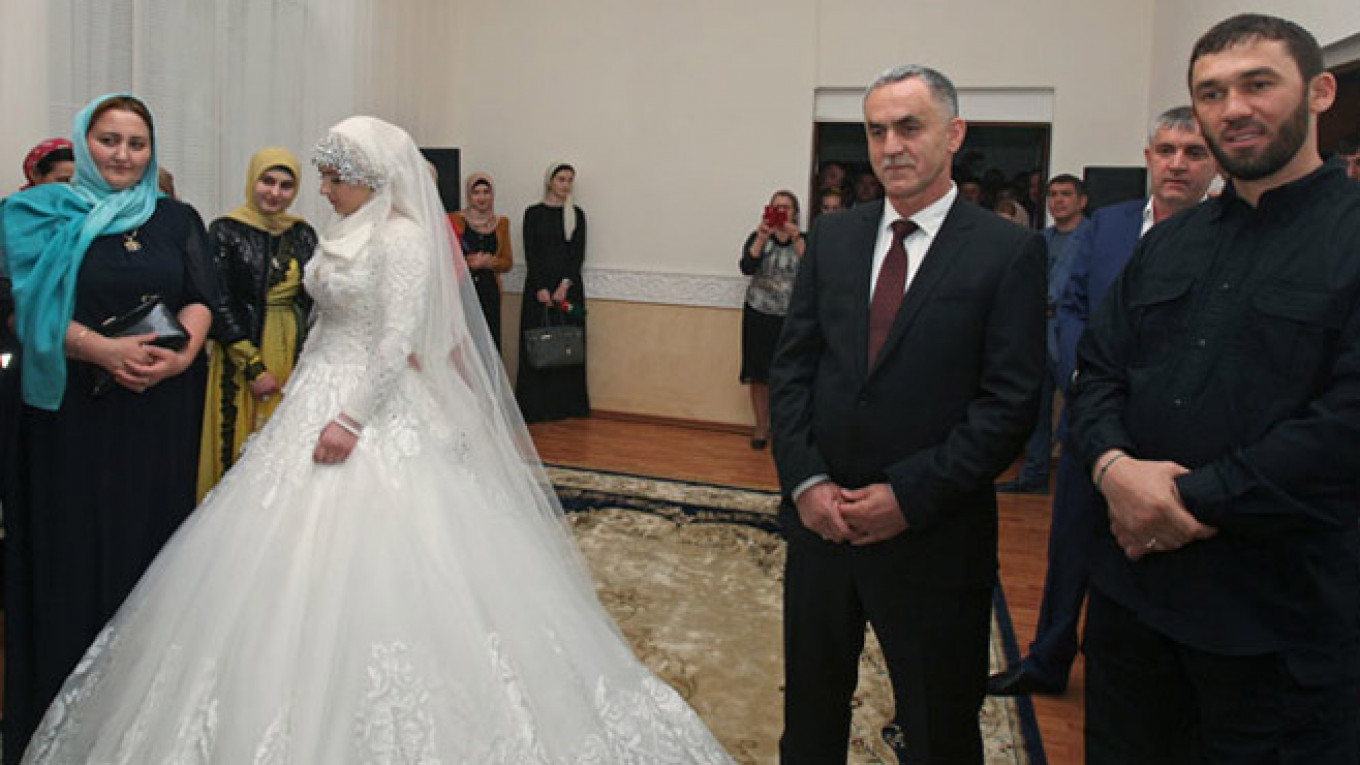"Look at the size of her breasts — she's obviously a woman, not a girl." "She's from a village, who's to say she didn't luck out by marrying a powerful policeman? Even if she didn't want to at first." "Why should I care about how they do things in Chechnya? Their traditions are their problem."
I've been reading the reactions of Russians to Chechnya's so-called "wedding of the millennium" on social media, and I can honestly say that even those who profess to be OK with it are obviously in doubt. Why else would people go to such lengths to excuse what happened?
To recap: Novaya Gazeta recently reported that a powerful Chechen police official was trying to marry a teenager by force. The 17-year-old girl, Kheda Goylabiyeva, would become his second wife, it was reported. The policeman first denied the allegations, but then Chechnya's top brass, including Ramzan Kadyrov, stepped in, saying Kheda's family had consented to the match.
Kheda was swiftly married off to the man, alternatively reported to be either 30 or 40 years her senior, in a much-touted ceremony that seemed designed to mock anyone who dares question the life-affirming and not at all creepy idea of pairing underage schoolgirls with men who look old enough to be their grandfathers.
Some Russian officials rushed to express their approval of the blessed nuptials, calling everyone who disagreed "prudes."
Fuzzy interpretations of Russian federal law — which ostensibly says no one can marry unless they are 18, unless there are special circumstances, such as pregnancy — were trotted out in defense of the marriage.
The Kremlin refused to comment, and it is obvious why.
Chechnya has caused enough headaches for Moscow already — from the slaying of opposition politician Boris Nemtsov to Kadyrov's (swiftly retracted) declaration that law enforcement from other regions should be shot if operating in Chechnya without permission.
Ordinary Russians, however, have debated and continue to debate what happened. And even among people trying hard to play down the genuinely scary implications of the wedding, a sense of unease is palpable.
Many Russians insist that Kheda's fate has nothing to do with them. Chechnya is far away, they argue. Its customs have nothing to do with the rest of the country. Anyway, their kids could never be in danger of being snatched by a policeman.
Yet the treatment of Kheda has highlighted some very specific ideas that people entertain about women, particularly women considered to be of lower status. Any suffering they experience is considered normal — in fact, they are meant to suffer.
The so-called "zhenskaya dolya," a woman's lot in life, is considered harsh — but perfectly acceptable in the grand scheme of things. It can make people sad and uncomfortable, but a kind of Stockholm syndrome, I would argue, prevents them from really questioning it.
This is because people in Russia are expected to side with power. They're equally expected to disdain the weak. It's nothing personal; it's just how power cults work.
Lower-status women — those who weren't lucky enough to be born as daughters of mighty state officials, those who come from provincial backgrounds, etc. — are awarded little protection in society.
In that sense, the wedding is a symptom of a larger issue. And by publicizing it so thoroughly, Chechnya is doing more than flexing its political muscle — it is beginning to set a wider agenda.
Contempt for civil society, the crushing of dissent, and a patriarchal attitude toward women — things Chechen leadership is famous for — find major resonance and approval in Moscow and beyond.
And Chechen support for Russia's misadventures in Ukraine have begun to make it seem as though Chechnya is owed even more prominent status on Russia's political landscape.
This is why all those eagerly insisting that "the wedding of the millennium" is an isolated event in some exotic, peripheral and irrelevant locale are kidding themselves.
The call is coming from inside the house.
Natalia Antonova is an American playwright and journalist.
A Message from The Moscow Times:
Dear readers,
We are facing unprecedented challenges. Russia's Prosecutor General's Office has designated The Moscow Times as an "undesirable" organization, criminalizing our work and putting our staff at risk of prosecution. This follows our earlier unjust labeling as a "foreign agent."
These actions are direct attempts to silence independent journalism in Russia. The authorities claim our work "discredits the decisions of the Russian leadership." We see things differently: we strive to provide accurate, unbiased reporting on Russia.
We, the journalists of The Moscow Times, refuse to be silenced. But to continue our work, we need your help.
Your support, no matter how small, makes a world of difference. If you can, please support us monthly starting from just $2. It's quick to set up, and every contribution makes a significant impact.
By supporting The Moscow Times, you're defending open, independent journalism in the face of repression. Thank you for standing with us.
Remind me later.


